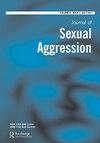From myth to reality: sexual image abuse myth acceptance, the Dark Tetrad, and non-consensual intimate image dissemination proclivity
IF 1.5
4区 社会学
Q2 CRIMINOLOGY & PENOLOGY
引用次数: 7
Abstract
ABSTRACT Despite media attention on non-consensual intimate image dissemination (NCII), the literature on the personality traits, attitudes, and beliefs that predict NCII approval, enjoyment, and perpetration is limited. With a sample of 810 undergraduate students, we examined the relationship between dark personality traits, acceptance of image-based sexual abuse-related myths, and NCII. We found that 48.2% of our participants did not oppose NCII perpetration, 71.4% did not oppose NCII enjoyment, and 97.8% did not oppose NCII approval. Moreover, we found that being a man, heterosexual, and scoring higher in dark personality traits predicted acceptance of Image-Based Sexual Abuse (IBSA)-related myths. In turn, accepting such myths predicted not opposing NCII proclivity. Our results underscore the importance of demystifying technology-facilitated sexual violence and promoting educational material that highlights lived experience and dispelling IBSA-related myths. PRACTICAL IMPACT STATEMENT This article may assist educators, policymakers, and stakeholders in designing strategies for the prevention of non-consensual intimate image dissemination (NCII) perpetration by explaining how acceptance of image-based sexual abuse myths, personality traits, and demographic characteristics are related to the willingness to accept, enjoy, or engage in NCII perpetration.从神话到现实:性形象滥用神话接受,黑暗四分体,和非自愿的亲密形象传播倾向
尽管媒体关注非自愿亲密图像传播(NCII),但关于人格特质、态度和信念预测NCII的批准、享受和实施的文献有限。我们以810名本科生为样本,研究了黑暗人格特征、对基于图像的性虐待相关神话的接受程度和NCII之间的关系。我们发现48.2%的参与者不反对NCII实施,71.4%不反对NCII享受,97.8%不反对NCII批准。此外,我们发现,作为男性,异性恋者,在黑暗人格特征中得分较高,预示着人们更容易接受基于图像的性虐待(IBSA)相关的神话。反过来,接受这样的神话预示着不会反对NCII的倾向。我们的研究结果强调了消除技术促进的性暴力的神秘性和推广强调生活经验的教育材料以及消除与ibsa相关的神话的重要性。本文通过解释基于图像的性虐待神话、人格特征和人口统计学特征的接受程度如何与接受、享受或参与非自愿亲密图像传播(NCII)犯罪的意愿相关,可以帮助教育工作者、政策制定者和利益相关者设计预防非自愿亲密图像传播(NCII)犯罪的策略。
本文章由计算机程序翻译,如有差异,请以英文原文为准。
求助全文
约1分钟内获得全文
求助全文

 求助内容:
求助内容: 应助结果提醒方式:
应助结果提醒方式:


